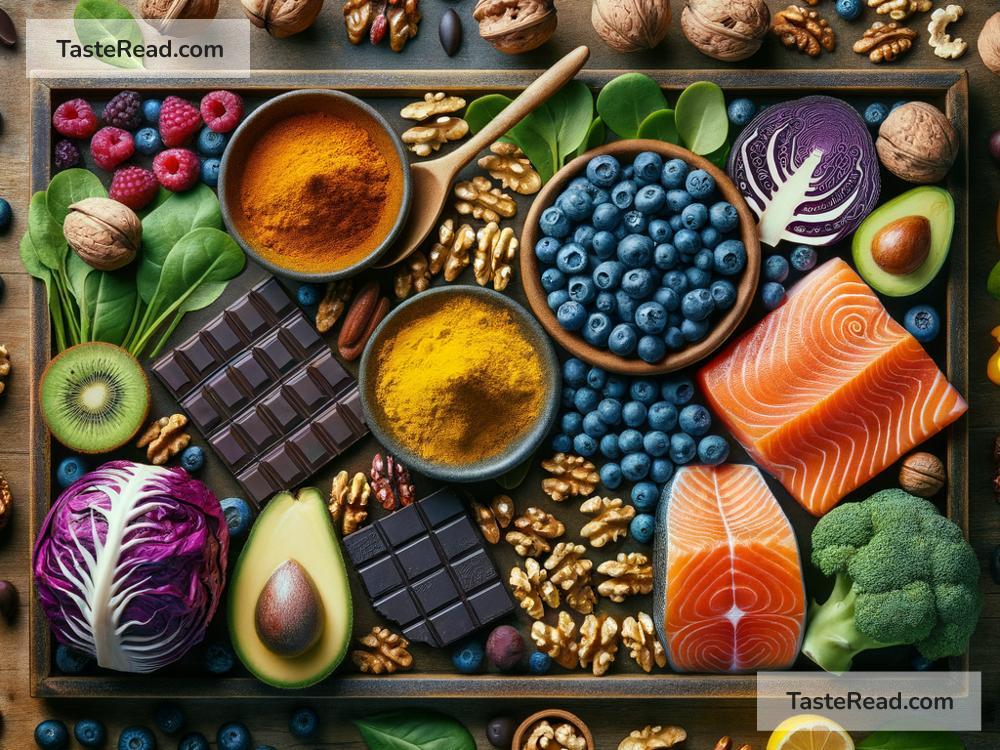Foods That Support Neurogenesis: Nourish Your Brain Naturally
Did you know that your brain has the ability to grow new brain cells? This process is called neurogenesis, and it plays a key role in keeping your brain healthy, improving learning, boosting memory, and even reducing the risk of mental health conditions like depression. While genetics, physical activity, and quality sleep contribute significantly to neurogenesis, the food you eat also matters a lot.
In this article, we’ll dive into simple and easy-to-understand tips for using food to support neurogenesis. Let’s explore some brain-friendly foods that you can add to your diet to help your brain thrive!
1. Blueberries: Little Superfoods for Your Brain
Blueberries are often referred to as “brain berries” for good reason. They are rich in antioxidants and flavonoids, which help reduce inflammation in the brain and encourage the growth of new neurons. Antioxidants also protect your brain cells from oxidative stress, which is linked to aging and neurological diseases.
Studies have shown that eating blueberries can improve memory and cognitive function. Plus, they’re delicious as a snack or in smoothies, oatmeal, or yogurt. Try incorporating a handful of blueberries into your meals a few times a week to keep your brain sharp.
2. Fatty Fish: The Omega-3 Powerhouse
Fatty fish like salmon, mackerel, sardines, and trout are packed with omega-3 fatty acids, especially DHA (docosahexaenoic acid). DHA is a building block of the brain and plays an essential role in neurogenesis. Omega-3s help form new brain cell membranes, improve communication between brain cells, and reduce inflammation.
If you’re not a fan of fish, you can also get omega-3 from plant-based sources like flaxseeds, chia seeds, and walnuts. Another option is taking an omega-3 supplement like fish oil—but always check with your doctor before starting a supplement.
3. Dark Chocolate: A Treat for Your Brain
Who doesn’t love a bit of chocolate? Good news: dark chocolate (70% or higher cocoa content) is excellent for your brain. It contains flavonoids, which boost blood flow to the brain and encourage the birth of new neurons. Dark chocolate also stimulates the release of endorphins, which can lift your mood and reduce stress.
Just remember that moderation is key. Aim for one or two small squares of dark chocolate daily, and skip sugary milk chocolates that aren’t as brain-friendly.
4. Leafy Greens: Veggies Packed with Brain Power
Spinach, kale, broccoli, and other leafy greens are full of nutrients like folate, vitamin K, beta-carotene, and antioxidants that support brain health and neurogenesis. Folate, in particular, helps build DNA and RNA, which are essential for new brain cells.
Leafy greens can be used in salads, smoothies, or light sautés. If you’re not used to eating these vegetables, start small by adding them to a few meals each week.
5. Turmeric: The Golden Spice
Turmeric is a bright yellow spice often used in Indian dishes, and it’s well-known for its powerful anti-inflammatory and antioxidant properties. The active compound in turmeric, called curcumin, supports neurogenesis by boosting levels of BDNF (brain-derived neurotrophic factor), a protein that encourages brain cell growth and survival.
To get the most benefit from turmeric, pair it with black pepper, which enhances its absorption in your body. You can add turmeric to soups, rice dishes, or even tea for an extra brain-health boost.
6. Nuts and Seeds: Tiny Nutrient Boosters
Nuts like almonds, walnuts, and cashews, along with seeds like sunflower seeds, flaxseeds, and chia seeds, are loaded with vitamin E, healthy fats, and antioxidants, all of which protect brain cells from damage and encourage new growth.
Walnuts, in particular, are a top choice for brain health because they are rich in omega-3s and antioxidants. Sprinkle nuts and seeds on your salads, yogurt, or oatmeal for a crunchy, nutrient-packed addition.
7. Avocados: Creamy Brain Fuel
Avocados are a great source of monounsaturated fats, which improve blood flow to the brain. Better blood flow means more oxygen and nutrients that encourage neurogenesis.
Avocados also contain vitamin E, a powerful antioxidant that helps protect your brain from damage caused by free radicals. Add slices of avocado to salads, toast, or smoothies for a creamy treat that’s also good for your brain.
8. Green Tea: Sip Your Way to Better Brain Health
Green tea contains L-theanine, an amino acid that can cross the blood-brain barrier and boost levels of dopamine and serotonin, improving mood and focus. It’s also packed with antioxidants called catechins, which support neurogenesis and protect brain cells from damage.
Swap your regular coffee for a cup of green tea a few times a week. Its calming effects can help reduce stress, which is another factor that affects brain health.
9. Whole Grains: Slow and Steady Energy
Whole grains like oats, quinoa, brown rice, and barley provide sustained energy and improve blood flow to the brain. They’re also rich in B vitamins, which are crucial for brain function and neurogenesis.
Choose whole grains instead of refined grains like white bread, pasta, or rice. They’ll keep your energy levels steady throughout the day and give your brain the fuel it needs.
Final Thoughts
Supporting neurogenesis isn’t about eating just one specific food—it’s about enjoying a variety of nutrient-rich, whole foods that boost brain health. These foods work together to reduce inflammation, promote better blood flow, and provide the essential nutrients your brain needs to grow and repair itself.
Building a brain-friendly diet doesn’t have to be complicated. Start by incorporating one or two of these foods into your weekly routine, and gradually expand as you get used to them. Pair these habits with regular exercise, good sleep, and stress management, and you’ll be giving your brain the best possible care.
Your brain is your greatest asset—so why not give it the nutrition it deserves?


